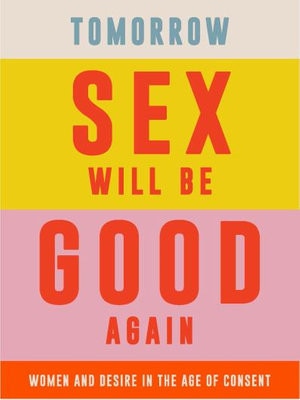Permission to enjoy sex
The twin issues of female sexual desire and female consent are not as straightforward as they may initially seem. Asserting boundaries may be a better protective measure.

British academic Katherine Angel, an alumna of Cambridge and Harvard, is the author of three nonfiction works exploring human sexuality – her own and that of others – and its philosophical resonance, particularly in terms of feminine dysfunction, liberation, and pleasure. The title of her new book, Tomorrow Sex Will Be Good Again: Women and Desire in the Age of Consent, is taken from an essay by French philosopher Michel Foucault in which he examined the uneasy relationship between sex and power.
The book opens with a beautifully written account of American pornographic performer James Deen and his call to female fans to “Do a Scene” with him. Girl X replied; he filmed their “quite charming” exchanges. The fan’s ambivalence hinges on her fear of losing status as a result of her lust. She is also (correctly) worried that this desire – for Deen, to be filmed with Deen, to assert her interest in pornography – will potentially cause her future problems.

The twin issues of female sexual desire and female consent, are, as Angel illustrates with the Deen story, not quite as straightforward as they may initially seem. In consent culture – “the widespread rhetoric claiming that consent is the locus for transforming the ills of our sexual culture” – women are expected to emphatically verbalise their desires prior to the act, as if ordering a pizza. When, she asks, “did we buy the idea that we know what we want, whether in sex or elsewhere? The rhetoric of consent too often implies that desire is something that lies in wait, fully formed within us, ready for us to extract.”
The necessarily forensic spin not only intellectualises the erotic, but has as its premise the idea that sex is, in essence, an inventoried and fundamentally masturbatory enterprise, as gay apps such as Grindr evidence.
Consent can reduce human beings to the sum of their sexual preferences without consideration for the fact that sex, at its best, is alchemical and emotional – a “conversation, mutual exploration, curiosity, uncertainty” – rather than unilateral.
Without the willingness “to take risks, to be open to the unknown”, joy and transformation cannot be experienced in the context of sex, and therein the rub: “pleasure involves risk, and that can never be foreclosed or avoided”.
Asserting boundaries, Angel believes, is a far more effective protective measure.
The conscious negotiation of imbalances, in oneself and in relation to the broader culture, is, perhaps, the truest marker of adulthood.
Angel, who clearly enjoys men, also enjoys the dance that culminates in sex, and prickles at the “contractual echoes of consent” and at its representation “as something a man wants, and something a woman agrees or refuses to yield”, positioning sex as an object policed by women.

For some people, sex is “something into which women don’t enter willingly; something into which they have to be persuaded or coerced – and it is something men do to women”.
Laws play a major role in the cultural entrenchment of such misogyny. The signalling of sexual availability is, as Girl X understood, potentially dangerous not only personally but legally, which is why lacy lingerie has been used in court as evidence of a female plaintiff’s bad sexual character.
As Angel writes: “A woman’s (presumed) desire – even just once, for one man – makes her vulnerable. Her desire disqualifies her from protection, and from justice. Once a woman is thought to have said yes to something, she can say no to nothing.”
If, after showing sexual interest, a woman refuses sex, she is thought to have only herself to blame for any repercussions, meaning that her withdrawal must be executed “cautiously, gingerly, covertly, so as to allow a man to save face, and to avoid antagonising him.” Incredibly, this very caution – paradoxically, derided by women’s magazines – is then used by lawyers as evidence of ambivalence or sexual provocation.
The gender disparities in terms of sexual satisfaction are equally disturbing. Women, Angel writes, suffer disproportionately from sexual anxiety, difficulties, and pain.
Ninety per cent of men and only 50 or so per cent of women orgasm during sex, suggesting that an uncomfortable percentage of men are inept on a number of levels. To women, “good sex” often means an absence of pain rather than an act of pleasure.
Gracefully argued and informed by flashes of brilliance, Tomorrow Sex Will Be Good Again: Women and Desire in the Age of Consent is a powerful contribution to the not always rational debate about consent and feminine sexual autonomy.
Antonella Gambotto-Burke’s new book, Apple: Sex, Drugs, Motherhood and the Recovery of the Feminine, will be published in 2022.
Tomorrow Sex Will Be Good Again: Women and Desire in the Age of Consent
Bloomsbury, Nonfiction
160pp, $19.95




To join the conversation, please log in. Don't have an account? Register
Join the conversation, you are commenting as Logout